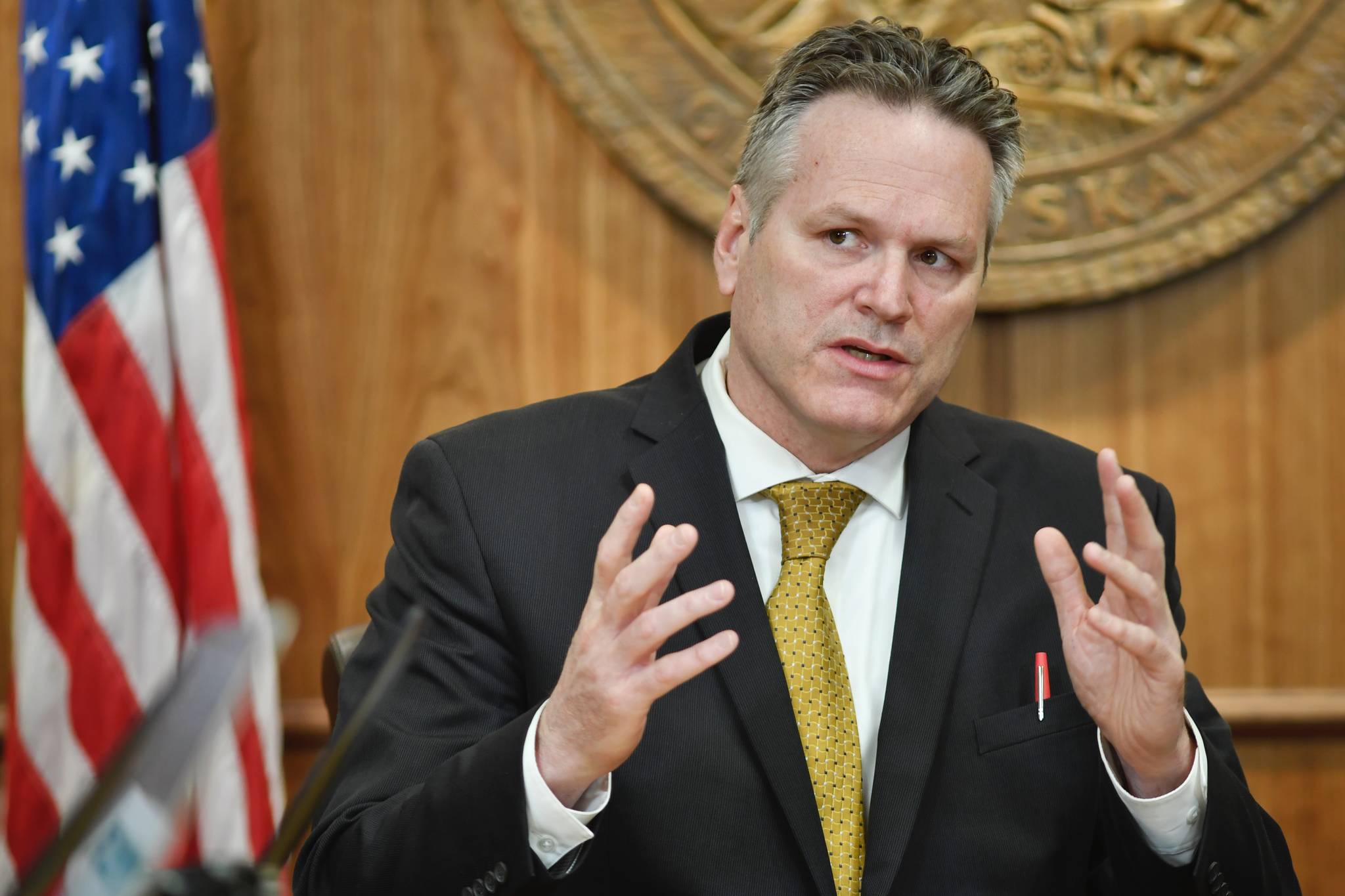If the Alaska Legislature doesn’t get everything done before June 14, lawmakers might have to finish their work in the Matanuska-Susitna Valley.
Gov. Mike Dunleavy said during a Facebook Live Town Hall on Friday that his administration is working on the logistics of having a special session in the Mat-Su Valley if the current special session (taking place in Juneau) ends without a budget. Dunleavy said those in his administration “think we’ve got pretty much everything worked out” for a session in the Mat-Su.
“We are certainly looking at a different venue (than Juneau) because we think maybe a change of venue, the ability for more individual Alaskans to come and be able to have an opportunity to voice their opinion with the Legislature, would be beneficial,” Dunleavy said.
[House bill pledges full dividend, but with a catch]
The governor said something similar when he declared the special session in mid-May, saying he thought a change of location might be good for lawmakers. He still settled on holding the current 30-day special session in Juneau.
The purpose of the current special session is to address crime legislation, the state’s budget, the amount and future of the Permanent Fund Dividend and education funding. At about the halfway point of the special session Friday, the Legislature has passed a crime bill and is close to an agreement on a budget. The PFD question still hangs over their head, and the Legislature is also preparing a lawsuit against the governor over education funding.
The suit, as lawmakers and the governor explained earlier this week, would be to determine whether a current Legislature can appropriate money in future years for future Legislatures. Dunleavy’s administration asserts this is not constitutional, while the Legislature and past administrations believe providing funding in advance is allowed.
[What the Legislature left on the table: Ferries, addiction treatment, new revenue]
The first session to be held outside Juneau was in 2007, when the Legislature held a one-day special session in Anchorage, according to information from the Legislative Affairs Agency. In 2015, the Legislature held a special session in Anchorage when the Capitol was being renovated.
In a phone interview Friday, Senate President Cathy Giessel recalled that session, and said that very few members of the public attended. She said that example calls the governor’s argument about getting more members of the public at the session into question.
The topic of moving meetings to Anchorage came up earlier this session as well, as a proposed ballot initiative seeking to move session to Anchorage has garnered some support. Lt. Gov. Kevin Meyer ruled in April that if an Anchorage group called Equal Access Alaska gets 28,501 signatures, their ballot measure could get approved to appear on the ballot in a statewide election soon.
Wayne Jensen, the chair of the Alaska Committee (which strives to keep Juneau the state’s capital), said in an interview Friday that Juneau is simply better set up to host the Legislature. All the infrastructure is here, staff is here, Gavel Alaska (which broadcasts floor sessions and meetings so the public can follow along) is here, Jensen pointed out. Considerations go beyond 40 representatives and 20 senators, he said.
“A special session isn’t just 60 people getting together,” Jensen said. “It’s probably three or four times that.”
Giessel, who lives in Anchorage, said it’s tempting to want to hold a session outside of Juneau but she has many reservations about doing so. At least Anchorage has a Legislative Information Office (LIO), she said, which Wasilla does not.
“I would love to be home, but at the same time we know that there are logistics issues,” Giessel said. “Our support staff has particular needs for secure internet lines, for video links and the Gavel to Gavel stuff. Even that is challenging at the Anchorage LIO, so to go to an area that doesn’t even really have an LIO, I don’t know how it could be logistically done.”
LAA estimated that this special session will cost the state between $500,000 and $1 million depending on whether lawmakers pass a budget, and therefore whether they collect per diem. Legislators’ per diem is cut off due to House Bill 44 (passed last year) which states that they can’t collect per diem if they don’t pass a budget in the regular session. Funding for the special session comes out of the Legislature’s budget, which already has money appropriated in case of a special session, LAA Executive Director Jessica Geary explained to the Empire recently.
LAA compared a session in Wasilla with a session in Juneau. Running the numbers without per diem, a special session in Wasilla would cost nearly $460,000 more than a session in Juneau. Running the numbers with per diem, a special session in Wasilla would cost just over $130,000 more than a special session in the capital city.
Hotel space is also a concern in Wasilla, according to LAA. In Juneau, on the other hand, the Baranof Hotel has offered 100 rooms to legislators, according to LAA.
• Contact reporter Alex McCarthy at amccarthy@juneauempire.com. Follow him on Twitter at @akmccarthy.

